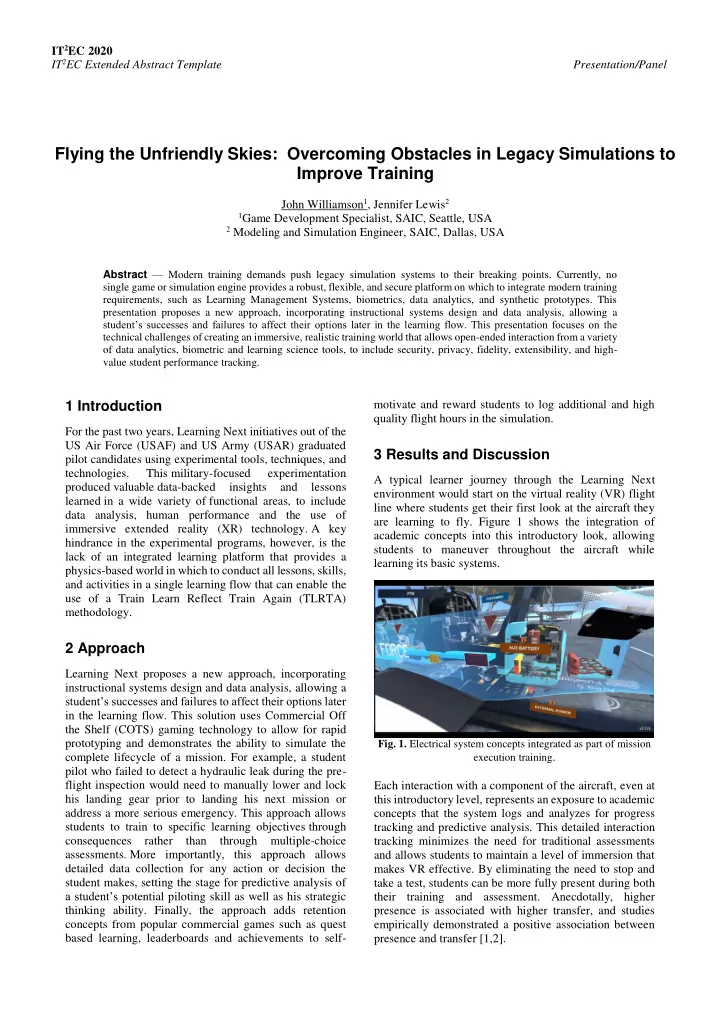

IT 2 EC 2020 IT 2 EC Extended Abstract Template Presentation/Panel Flying the Unfriendly Skies: Overcoming Obstacles in Legacy Simulations to Improve Training John Williamson 1 , Jennifer Lewis 2 1 Game Development Specialist, SAIC, Seattle, USA 2 Modeling and Simulation Engineer, SAIC, Dallas, USA Abstract — Modern training demands push legacy simulation systems to their breaking points. Currently, no single game or simulation engine provides a robust, flexible, and secure platform on which to integrate modern training requirements, such as Learning Management Systems, biometrics, data analytics, and synthetic prototypes. This presentation proposes a new approach, incorporating instructional systems design and data analysis, allowing a student’s successes and failures to affect their options later in the learning flow. This presentation focuses on the technical challenges of creating an immersive, realistic training world that allows open-ended interaction from a variety of data analytics, biometric and learning science tools, to include security, privacy, fidelity, extensibility, and high- value student performance tracking. 1 Introduction motivate and reward students to log additional and high quality flight hours in the simulation. For the past two years, Learning Next initiatives out of the US Air Force (USAF) and US Army (USAR) graduated 3 Results and Discussion pilot candidates using experimental tools, techniques, and technologies. This military-focused experimentation A typical learner journey through the Learning Next produced valuable data-backed insights and lessons environment would start on the virtual reality (VR) flight learned in a wide variety of functional areas, to include line where students get their first look at the aircraft they data analysis, human performance and the use of are learning to fly. Figure 1 shows the integration of immersive extended reality (XR) technology. A key academic concepts into this introductory look, allowing hindrance in the experimental programs, however, is the students to maneuver throughout the aircraft while lack of an integrated learning platform that provides a learning its basic systems. physics-based world in which to conduct all lessons, skills, and activities in a single learning flow that can enable the use of a Train Learn Reflect Train Again (TLRTA) methodology. 2 Approach Learning Next proposes a new approach, incorporating instructional systems design and data analysis, allowing a student’s successes and failures to affect their options later in the learning flow. This solution uses Commercial Off the Shelf (COTS) gaming technology to allow for rapid prototyping and demonstrates the ability to simulate the Fig. 1. Electrical system concepts integrated as part of mission complete lifecycle of a mission. For example, a student execution training . pilot who failed to detect a hydraulic leak during the pre- flight inspection would need to manually lower and lock Each interaction with a component of the aircraft, even at his landing gear prior to landing his next mission or this introductory level, represents an exposure to academic address a more serious emergency. This approach allows concepts that the system logs and analyzes for progress students to train to specific learning objectives through tracking and predictive analysis. This detailed interaction consequences rather than through multiple-choice tracking minimizes the need for traditional assessments assessments. More importantly, this approach allows and allows students to maintain a level of immersion that detailed data collection for any action or decision the makes VR effective. By eliminating the need to stop and student makes, setting the stage for predictive analysis of take a test, students can be more fully present during both a student’s potential piloting skill as well as his strategic their training and assessment. Anecdotally, higher thinking ability. Finally, the approach adds retention presence is associated with higher transfer, and studies concepts from popular commercial games such as quest empirically demonstrated a positive association between based learning, leaderboards and achievements to self- presence and transfer [1,2].
Recommend
More recommend